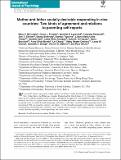| dc.contributor.author | Marc H Bornstein, Diane L Putnick, Jennifer E Lansford, Concetta Pastorelli, Ann T Skinner, Emma Sorbring, Sombat Tapanya, Liliana Maria Uribe Tirado, Arnaldo Zelli, Liane Peña Alampay, Suha M Al‐Hassan, Dario Bacchini, Anna Silvia Bombi, Lei Chang, Kirby Deater‐Deckard, Laura Di Giunta, Kenneth A Dodge, Patrick S Malone, Paul Oburu | |
| dc.date.accessioned | 2020-08-05T12:40:04Z | |
| dc.date.available | 2020-08-05T12:40:04Z | |
| dc.date.issued | 2015-06 | |
| dc.identifier.citation | 58 | en_US |
| dc.identifier.uri | https://repository.maseno.ac.ke/handle/123456789/1855 | |
| dc.description.abstract | We assessed 2 forms of agreement between mothers’ and fathers’ socially desirable responding in China, Colombia,
Italy, Jordan, Kenya, the Philippines, Sweden, Thailand and the United States (N =1110 families). Mothers and
fathers in all 9 countries reported socially desirable responding in the upper half of the distribution, and countries varied
minimally (but China was higher than the cross-country grand mean and Sweden lower). Mothers and fathers did not differ
in reported levels of socially desirable responding, and mothers’ and fathers’ socially desirable responding were largely
uncorrelated. With one exception, mothers’ and fathers’ socially desirable responding were similarly correlated with
self-perceptions of parenting, and correlations varied somewhat across countries. These findings are set in a discussion of
socially desirable responding, cultural psychology and family systems. | en_US |
| dc.publisher | John Wiley & Sons, Ltd | en_US |
| dc.subject | : Socially desirable responding; Mothers; Fathers; Culture. | en_US |
| dc.title | Mother and father socially desirable responding in nine countries: Two kinds of agreement and relations to parenting self‐reports | en_US |
| dc.type | Article | en_US |

